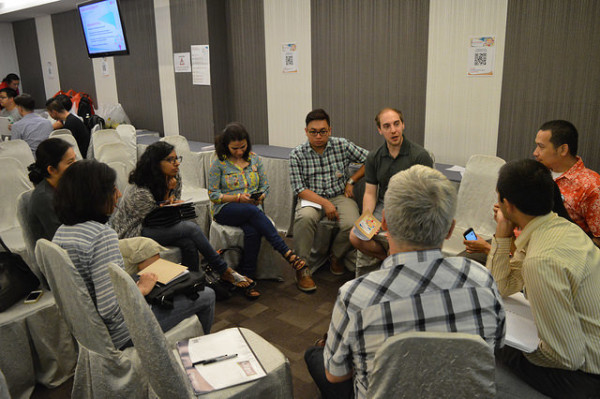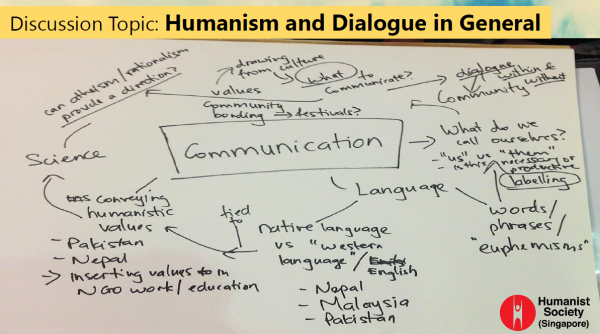
On the first day of the Asian Humanism Conference, participants broke into four groups to discuss four major questions based around the theme: Unity in Diversity. This is the first discussion:
Topic: Humanism and Dialogue in General
1. The group focused on ways to communicate humanist ideas to the broader public, given the numerous challenges they face in their respective countries.
2. First, the group discussed whether the choice of language mattered when it comes to communicating what humanism is. Should English or the native language be used to explain humanism? From the discussion, it emerged that both approaches have its strengths. If the native language is used, the speaker would come across as more friendly and intimate. If English is used, the communicator will come across as more educated and more open to new ideas such as human rights. However, the group noted that English will not be easily understood by many people in the region.
3. The group then discussed about the type of words that should be used when talking about humanism. In Singapore, for example, very friendly words such as “unity” and “diversity” have to be used for the conference theme. In countries where conference participants came from (Malaysia, Indonesia, Pakistan, for example), humanists have to use very nice words. For example, debate should be framed as “discussion”. Instead of talking about “religion”, humanists need to talk about how people are culturally “diverse”. This is one soft way of communicating humanist values, instead of being upfront.
4. A member of the group discussed about inserting humanist values into the work you do. Instead of ‘talking’ about humanism, you ‘do’ humanism. This is a very powerful way of communicating, walking the walk instead of talking the talk. Science can be used as a vehicle to promote humanist values and work with the government. For example, in Nepal, humanists work with the government to promote scientific literacy, debunking superstitious and harmful ways of doing things.
5. Next, the group discussed whether atheism or science alone is enough to provide a direction for people. Are community bonding and festivals needed? Religion has festivals, but what about humanists? Uttam (from Nepal) suggested drawing ideas from the countries’ respective cultures. For example, some cultural practices and values are more philosophical than religious, such as Confucianism in the case for Chinese culture.
6. The group then talked about labels. What should we call ourselves when we talk about humanism? Should we call ourselves humanists or should we just regard ourselves as ‘fellow human beings’? Should we draw a distinction between us and others? Is it really worth it? Maybe yes sometimes, maybe no?
7. The group also brought up the importance of physical presence. Huifen (from the HSS) talked about her involvement with interfaith work. Visually presenting yourself at an interfaith gathering, and showing others that you can share the same good values as the religious as an atheist or agnostic, will confront others with the reality that the irreligious can be good people.
8. Lastly, the group then talked about communication between humanists. Humanists come from very different backgrounds and have very different ways of doing things. This can lead to disunity. The group concluded that this boils down to the importance of forming a strong humanist community.
Other discussion summaries:





